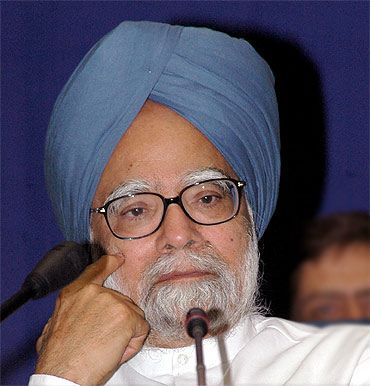A recommendation to appoint officers from the defence forces at the level of director in the ministry of defence is being ferociously challenged, reports Sheela Bhatt.
The ongoing battle between Indian Army chief General V K Singh and the ministry of defence has now spread to the level of policy making, high-level sources in the government told Rediff.com
The fundamental issue in the psychological battle General Singh has waged against the government is that he wants radical changes made in the way arms deals are struck in India.
General Singh and other retired and serving army officers would declare victory if military officers are part of the defence secretary's team when decisions on arms purchases are made at the MoD.
Sources have told Rediff.com that the important sub-committee of the Task Force on National Security has recommended that officers of the defence forces be appointed at the level of director in the ministry of defence.
It is a baby step, but an important one.
This would dramatically change the perception of the MoD in the eyes of India's defence personnel.
But this recommendation is being challenged ferociously. There have been reports emanating that the controversies swirling around the army chief have cast their shadows on the deliberations of the task force on national security, which was set up last July.
In August 2011, General Singh briefed the task force, providing a comprehensive view of the issues concerning the army. He told members of the task force that there was a breakdown in the Indian Army's procurement policy.
Surprisingly, the task force did not act urgently and bring the issue to the prime minister's notice.
The task force seems to have treated General Singh's concerns in routine fashion. It appears the task force, which is headed by former Cabinet secretary Naresh Chandra, one of India's distinguished civil servants, is awaiting a formal completion of its assignment. It is expected to submit its report by the end of April.
Government sources claim a group consisting of retired diplomats and civil servants have opposed the inclusion of army officers in the MoD.
Rahul Bedi, the well-known defence expert and correspondent for Jane's Defence Weekly, says, "Since the last 20, 30 years experts have given advice to the government to induct uniformed men in the MoD. It's frightening to see delays in taking such decisions. The way this situation can escalate is very frightening. I am not saying that there is going to be a military takeover, but the morale of the soldiers is likely to be adversely affected."
"As it is," he added, "the Indian soldier looks upon the babus (civilian bureaucrats) and politicians as chors, and this is not going to change. This (the opposition to induct military officers at the MoD) is only going to reinforce his belief and his dislike of the MoD and the babus of the MoD and the political class."
When officers of India's armed forces sit along with the babus, Bedi says a certain responsibility and accountability will be imposed upon this newly formed establishment to make change come about.
"Let us not forget that in all societies -- whether it is in the West or in India or in other countries around Asia -- military establishments are the last to change," says Bedi.
"They are the most difficult to change," he adds. "I think it's about time we overcame our allergy for the armed forces."
The core issue of the ongoing tensions between General V K Singh and the ministry of defence is that most of the powers of procurement of weapons and equipment lie with the MoD.
It is perhaps time the Indian Army's sensitivities are taken care of in the task force's report.








